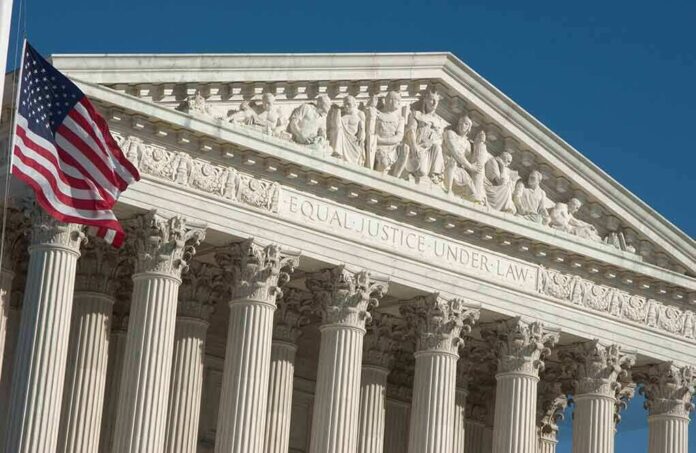
The Supreme Court’s upcoming review of a botched FBI raid in Georgia could reshape the accountability framework for federal agents.
Quick Takes
- Supreme Court is reviewing a mistaken FBI raid in Georgia, potentially impacting federal liability laws.
- The case involves Trina Martin’s home raid in 2017, where flash-bangs were used and Martin’s fiancé was wrongfully handcuffed.
- Federal Courts previously shielded agents under the Supremacy Clause, citing discretionary immunity.
- Key focus areas include the Federal Tort Claims Act’s discretionary function exception and the Supremacy Clause.
FBI Raid Error Under Judicial Scrutiny
The Supreme Court has put a spotlight on a controversial 2017 FBI raid in Georgia during “Operation Red Tape.” The raid went awry when SWAT agents targeted the wrong house due to GPS errors, leading to Trina Martin’s home being mistakenly stormed. Her fiancé was handcuffed, and the family faced armed interrogation. The raid, which involved destructive flash-bang grenades, left the family traumatized. Despite the FBI’s apology, Martin’s legal team, represented by the Institute for Justice, pursued legal action on grounds of false arrest and negligence.
Post-raid, the family’s lawsuit highlighted systemic flaws in holding federal agents accountable. The Federal Tort Claims Act (FTCA), enacted for remedies in such cases, presents a challenge due to its discretionary function exceptions. These exceptions protect agents if actions align with federal policy, complicating accountability pursuits. The district court previously dismissed the family’s claims, citing qualified immunity and the supremacy clause. The 11th Circuit Court upheld this decision, showcasing the judiciary’s role in law interpretation rather than rewriting.
In @NRO, my @IJ colleague Dylan Moore and I discuss our latest Supreme Court case, seeking federal #PoliceAccountability against an FBI SWAT team that raided an innocent family.
We are briefing Martin v. U.S. now.
Argument will be 4/29.
(Thanks to @RealDarylJames.) https://t.co/dYQlq46ZAo pic.twitter.com/rMOVxXFCIW
— Patrick Jaicomo (@pjaicomo) March 2, 2025
Broad Support and Implications
The complexity of this case stems from its implications for federal and public interests. Diverse groups, including the ACLU and law professors, filed amicus briefs urging the lawsuit to proceed, asserting the importance of government accountability. According to Institute for Justice Attorney Dylan Moore, “Such unequivocal support from an ideologically diverse group of sitting legislators shows that this case cuts across party lines.” They argue that the 11th Circuit’s interpretation of the FTCA contradicts its core intention, and the Circuit’s use of qualified immunity doesn’t fully consider the gravity of mistaken raids.
The Supreme Court’s decision could prompt a reevaluation of existing boundaries regarding federal operations and individual rights. Trina Martin’s case not only raises questions about constitutional protections but also poses potential changes to legal responsibilities for federal missteps. The Martin family has vocalized concerns about emotional and physical scarring from the raid, emphasizing a need for reassessment in operational procedures.
Future Considerations
This pivotal case underscores the Supreme Court’s crucial role in addressing systemic accountability issues involving federal agencies. The verdict may redefine federal employee protections and jurisdictional interpretations under the FTCA. With bipartisan congressional support, there’s a consensus that judicial accountability must align with legislative intent. Both progressive and conservative corners advocate for a return to FTCA’s foundational text, aiming to prevent unnecessary barriers for civilians seeking redress.
The judicial considerations in Martin’s case might set a precedent for future federal accountability and establish clear operational guidelines to prevent similar occurrences. The Supreme Court’s decision will reverberate through legal and federal domains, highlighting the intricate balance between agent duties and citizen protections.
Sources:
- On to the Supreme Court: Atlanta family rebuilds hope after wrongful FBI house raid
- Support From Across the Ideological Spectrum Pours in for Family Seeking Justice at the Supreme Court Over FBI Wrong House Raid | Constitutional Accountability Center
- Supreme Court will review FBI’s immunity in lawsuit over mistaken house raid












